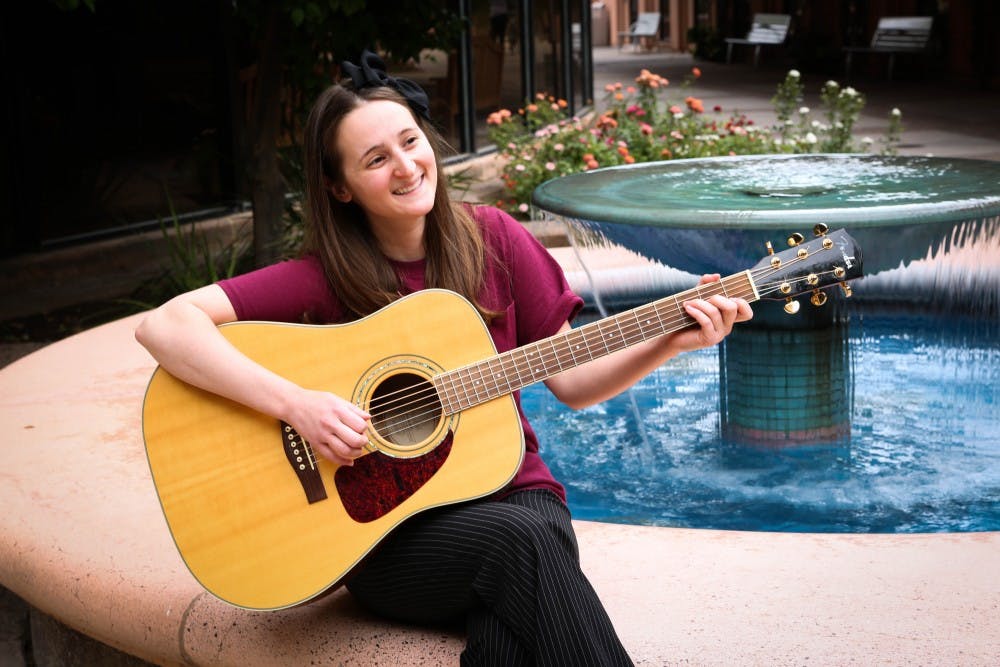Each week reporter Noelle Lilley will tackle a different major, tour its school and talk to its students in the hopes of highlighting the uniqueness and diversity of our beloved university. This is "ASU According To You."
Some problems in life are just too hard to figure out on your own. This is where therapists and counselors step in, ready and educated to help sort out this complicated thing we call life. From family and couples therapy to anger management and psychotherapy, therapy is one of the oldest forms of healing. But what if there was a way to get the same help through music?
ASU's School of Music at the Herberger Institute is creating the next generation of revolutionary music therapists who are eager and ready to better the world around them, one tune at a time.
Music therapy is defined by the Music Therapy Association as "the clinical and evidence-based use of music interventions to accomplish individualized goals within a therapeutic relationship by a credentialed professional who has completed an approved music therapy program."
Taryn Gordon is a masters student and graduate teaching assistant of the music therapy program with a passion for music that is rivaled only by her passion for helping others. With a bachelor's in music education, Gordon said she taught elementary school students, and soon came to realize that her biggest joy came not when students mastered an instrument or song, but when they grew socially or mentally from playing music.
She said this joy motivated her to come to the music therapy program at ASU. Gordon was also drawn to the excellent faculty the program boasts, like the department's director Robin Rio.
"(Rio) works very hard to offer us opportunities to succeed and get all the experience we need," she said.
Many faculty members have also won numerous awards and written books on music therapy, such as "Connecting Through Music With People With Dementia" by Robin Rio and "Music and Soulmaking" by former director and professor Barbara Crowe.
Students of the music therapy program complete all the music classes expected of a music performance student in addition to therapy classes that are typically begun in their junior year of college, such as verbal processing and repertoire.
Gordon explained that what is special about music therapy students is their ability to not only expertly play instruments and sing, but to manipulate those talents in a way that can assist a client in accomplishing their social or developmental goals.
"Music therapists are the highest forms of musicians," Gordon said. "Clients won’t relate to you if you can’t play an instrument well."
One of the most unique aspects of the program is the pre-clinical sessions and internships that all students complete in their undergraduate and graduate years. In these sessions, the students go out into the community and volunteer at various hospitals, facilities and organizations. The students create, plan and conduct music therapy activities with various individuals from children with developmental disabilities, and at-risk teens to veterans with post-traumatic stress disorder and adults who have Alzheimer's. Guitars for Vets, New Horizons, Aurora Behavioral Health System, and Barrow Neurological Institute are just a few of the nationally recognized facilities students can work at.
"Every session is the best session of my life," Gordon said.
Gordon explained that music therapy allows the therapist to connect with a client in a way other therapeutic means might not be able to. She said that because music is a universal medium, using it as therapy simply makes sense.
"Music is distinct from other therapies because it allows us to reach everyone," Gordon said. "There’s something musical for everyone. ... These instruments help give you a voice when you didn’t know you had one."
Upon graduation, Gordon said she plans to get a doctorate in music therapy, conduct music therapy research and eventually open her own business. With a desire to work in the mental health industry, she also hopes to work to eradicate the stigma associated with mental health.
With a future career in a highly respected field and profound hands-on experience, the music therapy students at ASU will surely make their mark on the world with their hands as full as their hearts.
Related links:
ASU According To You: An Aviation Student
ASU student finds success after fleeing Iraq
Reach the reporter at nlilley@asu.edu or follow her @noelledl on Twitter.
Like The State Press on Facebook and follow @statepress on Twitter.




